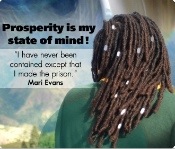Following up on the last article, Ward Minnis in his series of meditations on the viability of making a living off of art in The Bahamas writes to illustrate his position. First, he clarifies the sticky point of "viability":
...when I ask is it ‘viable’? I am not asking ‘is it possible?’ Because, of course it’s possible. What I am really asking is this: if this is what you love, can you live off of it?
And then, clever man, he makes reference to the Day of Absence observations in Nassau:
Bahamians who want to exercise their talents in the cultural industries are faced with the choice of pursuing their callings as hobbies at home, or of leaving home to make a living by their gifts elsewhere. And we are all the poorer for it.
If you haven't done so yet, subscribe to Ward's feed, because what he's doing is provocative but important. What he's developing in this series is a blueprint to change the state of affairs for artists in this country. The lament of those of us who established the Day of Absence -- the whole purpose of establishing that day of observance (which will be coming again in February 2010, have no fear) is that although it is indeed possible to create viable economic activity in the arts in our Bahamaland, everything in the society is ranged against it.
This is being written against the backdrop of TaDa's ArtOvation (internet-streamed, thanks to Star 105.9), and she's talking with guests about possibilities, viabilities, and so on.
In order for this viability really to exist, though, the society as a whole has to buy into the idea of supporting Bahamian culture with more than their lips, but also with their pockets. We are avid consumers of culture -- but we prefer other people's. Last semester students at COB conducted an on-campus survey that indicated that young Bahamian college students (who spend, on average, around $50 a week), are more willing to pay money for parties or live concerts (nationality of the musicians not specified) than they are to pay money to see Junkanoo, our premier festival, and the one which, if supported, could actually generate real employment. Perhaps that's pushing the issue a little too far, or in a direction which has its own built-in controversy, but perhaps not. What I'm hoping to show is that we have the disposable income as Bahamians to support far more artistic activity than we do; but it all depends on the choices we make as consumers.
So once again, I want to stretch the debate. The reason I disagreed so strenuously with the idea that we can't have a viable film industry here is that film is a potted medium. Like the visual arts, it can be separated from its creation and have a life well beyond its making. It doesn't all have to be assembled in one place and one time.
For instance. One can be an animator and do all one's work at home, alone, and not have to pay anybody else but oneself, and make a living; one can be a cinematographer or a set builder or a location manager and make a living (both off local films and off those foreign producers who shoot in The Bahamas on location). One can make art films and get grants from international agencies and inject them into the film festival circuit and make a living; or one can be a documentary filmmaker and make a very good living indeed, with only oneself and one's camera, one can make filmmaking viable.
What's a whole lot harder is to provide enough work for other people to give up their day jobs and enter the film industry. Neither film nor theatre has generated enough revenue yet in The Bahamas to enable actors, for instance, or front-of-house personnel, or box office personnel, or playwrights, to make a living off the performing arts. Unlike musicians, filmmakers and others, actors, playwrights and others must work in other jobs for a living. Unless you are willing and/or able to diversify, to become a Michael Pintard (who is a public speaker, an actor, a playwright, a poet, a producer, a landlord and a consultant), viability is difficult. Part of the issue, of course, is the question of payment. It's just possible for a filmmaker to make enough money to keep herself alive; but the development of these industries depends on helping to keep other people alive as well, and that's where the difficulty comes in.
So though I'm going to wait till Ward's finished and moved on to theatre (which he believes is a viable industry) before I continue this argument. But I'm going to encourage you guys to be like me -- keep your eyes peeled and check out Ward's blog for updates!

